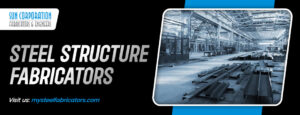Table of Contents:
- Steel is the preferred choice in the industrial – But why?
- Understanding the crucial role of steel structures in heavy industries
- The importance of reliable steel structure fabricators
- Key factors to consider when choosing a steel structure fabricator
- End note
In the heavy industry, steel structures serve as the backbone of numerous projects. It provides strength, durability, and stability. These structures are responsible for supporting massive machinery, buildings, and infrastructure.
These withstand the demanding conditions of heavy industries. For instance, manufacturing, mining, refineries, construction, and energy production.
In this blog post, we will delve into the essential role of steel structure fabricators. We shall also highlight the key parameters to consider when choosing the right fabricator for your heavy industry needs.

Steel is the preferred choice in the industry– But why?
Industrial projects require materials that can withstand heavy loads, endure harsh conditions, and provide a safe and efficient working environment. Among the various construction materials available, steel has emerged as the preferred choice for numerous industrial applications.
The strength and durability of steel in industrial settings:
Steel possesses exceptional strength and durability, making it an ideal material for industrial projects. Its high tensile strength allows it to resist heavy loads, impacts, and extreme weather conditions.
This quality ensures the structural integrity of industrial buildings, bridges, and other infrastructure, providing a safe working environment for employees.
Steel’s durability also translates to longevity. Industrial projects often require structures that can withstand long-term use and frequent maintenance.
Cost-effectiveness:
Steel’s cost-effectiveness and efficiency in industrial construction are major factors behind its preference. Steel components can be prefabricated off-site, reducing construction time significantly. This time-saving feature enables faster project completion, resulting in lower labour costs and reduced operational downtime.
Moreover, steel is a versatile material that can be customized to fit various industrial project requirements. Its modularity allows for easy expansion and modification.
Thus, it becomes capable of facilitating future adaptations or reconfigurations. Therefore, this technical flexibility enhances the overall cost-effectiveness of steel structure fabrication and reduces the need for costly renovations.
Sustainable and eco-friendly features of steel:
In an era where sustainability is of paramount importance, steel stands out as an environmentally friendly choice for industrial projects. Steel is a highly recyclable material, with a recycling rate that exceeds other construction materials.
The recyclability of steel reduces the demand for raw materials and minimizes the environmental impact of industrial projects. Furthermore, steel is energy-efficient and can be incorporated into energy-saving systems. Its high thermal conductivity allows for better insulation, reducing heating and cooling costs.
In addition to that, steel’s reflective properties enable the use of natural light, reducing the need for artificial lighting and promoting energy conservation.
Understanding the crucial role of steel structures in heavy industries:
Steel structures play a vital role in heavy industries due to their exceptional strength-to-weight ratio, versatility, and durability. They offer the necessary support and stability required to sustain heavy loads and withstand harsh environmental conditions.
Steel structures are commonly used in the construction of factories, warehouses, power plants, oil refineries, and mining facilities, among others.
One of the primary advantages of steel structures is their ability to be prefabricated off-site, ensuring faster construction and minimizing on-site disruptions. Steel also possesses excellent resistance to fire, corrosion, and extreme weather conditions.
Hence, these basic factors make steel an ideal option for lots of heavy industry applications.
The importance of reliable steel structure fabricators:
To ensure the successful execution of heavy industry projects, it is crucial to engage reliable and experienced steel structure fabricators. These professionals possess the expertise and knowledge required to transform design concepts into high-quality steel structures.
Therefore, they can meet the specific requirements of heavy industry applications.
A reputable fabricator employs skilled engineers, designers, and technicians. Hence, they work collaboratively to produce precise and accurate structural components. They utilize advanced software and cutting-edge technologies to create detailed fabrication drawings.
It helps them to conduct structural analysis, and optimize designs for cost-effectiveness and efficiency.
Working with a reliable fabricator not only ensures the structural integrity of your project but also provides valuable support throughout the entire fabrication process. From material selection and sourcing to fabrication, quality control, and on-time delivery, a competent fabricator will handle every aspect with precision and professionalism.

Key factors to consider when choosing a steel structure fabricator:
Selecting the right entity for steel structure fabrication for your heavy industry project is critical for its success. Here are some essential factors to consider during the decision-making process.
- Experience and expertise: Look for fabricators with a proven track record in the heavy industry sector. Experience brings in-depth knowledge of industry standards, regulations, and best practices, ensuring compliance and quality in your project.
- Quality control measures: Inquire about the fabricator’s quality control procedures. A reputable fabricator will have stringent quality control protocols in place. It incorporates inspections, testing, and certifications, to ensure the highest standards of fabrication.
- Technological capabilities: Assess the fabricator’s technological capabilities and software tools. Advanced technologies like computer-aided design (CAD) and building information modeling (BIM) enable efficient fabrication processes, accurate detailing, and better project visualization.
- Project management skills: Effective project management is crucial for timely completion. Look for fabricators with a proven ability to manage resources, meet deadlines, and communicate transparently throughout the project lifecycle.
- Flexibility and scalability: Consider fabricators with the capacity to handle projects of varying sizes and complexities. A fabricator with a wide range of capabilities can adapt to your specific requirements and deliver tailor-made solutions.
Choose wisely and embark on your construction journey with confidence. You may find Sun Corporation is the best in this regard.
End note:
In the heavy industry, the role of steel structure fabricators cannot be overstated. These experts ensure the safe and efficient construction of robust steel structures that form the foundation of heavy industrial projects. By selecting a reliable fabricator you can ensure the success of your heavy industry endeavors.
